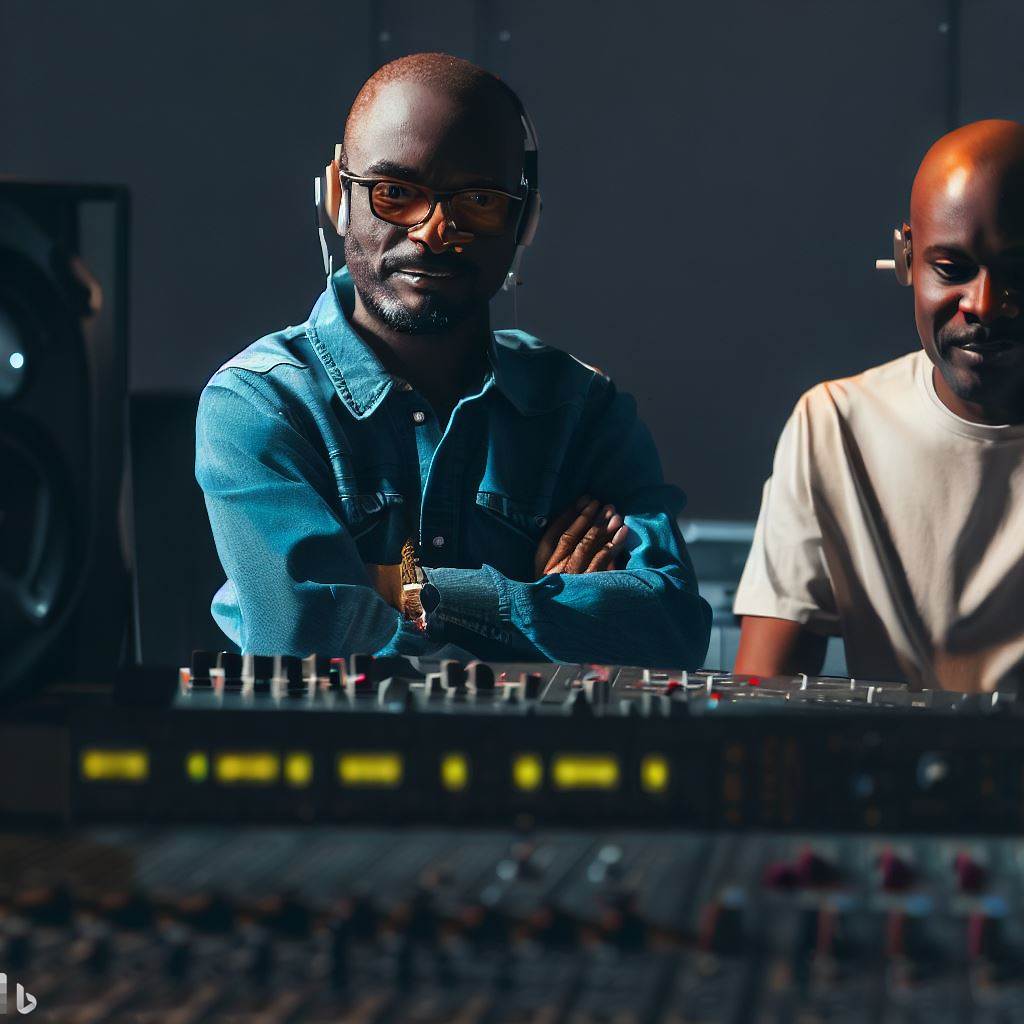Introduction
Nigerian music producers have become significant players in the global music industry, influencing sounds worldwide and Nigerian Music Producers Impact on Global Sounds
Nigeria’s music scene has gained international recognition, contributing to the country’s cultural impact globally.
Nigerian music producers play a vital role in shaping the diverse sounds that have become popular worldwide.
With their unique creativity, innovation, and production skills, these producers have propelled Nigerian music to new heights.
The music they create reflects the rich blend of traditional African sounds with Western influences, resulting in a distinct sonic identity.
In recent years, Nigerian music has seen a surge in popularity, attracting global audiences and collaborations with international artists.
This success has not only elevated Nigerian music but also shed light on the country’s talent pool and creative industry.
Nigerian music producers have proven themselves as tastemakers and trendsetters, introducing fresh and groundbreaking sounds to the global music landscape.
Their collaborations and productions propelled Nigerian and African music into the mainstream, gaining widespread recognition.
Nigerian music producers go beyond entertainment, acting as a cultural bridge, linking Nigeria globally and fostering understanding.
Nigerian music actively promotes African culture and sparks global interest by igniting appreciation for African sounds.
In the following sections, we will delve deeper into the contributions , and Nigerian Music Producers Impact on Global Sounds.
Read: Earnings and Revenue: The Financial Side of Nigerian Music Production
Nigerian Music Producers and their Influence
Nigerian music producers have played a significant role in shaping the global soundscape.
From the pioneers who established Nigerian musical styles to the contemporary producers bringing Afrobeat to the world stage, their contributions are undeniable.
A. Pioneers of Nigerian music production
Starting with the pioneers of Nigerian music production, iconic figures such as Fela Kuti, Tony Allen, and King Sunny Ade revolutionized the Nigerian music scene.
Fela Kuti, also known as the pioneer of Afrobeat, fused traditional Nigerian rhythms with jazz and funk, creating a unique sound that continues to influence artists globally.
Tony Allen, Fela Kuti’s drummer and collaborator, contributed to the development of Afrobeat and created a rhythmic foundation that still resonates in modern Nigerian music.
King Sunny Ade, known as the “King of Juju music,” introduced the world to Nigerian juju music, a genre characterized by its distinctive guitar-driven sound and rich percussion.
These influential producers not only shaped Nigerian musical styles but also had a profound impact beyond Nigeria’s borders.
Their music transcended cultural boundaries and gained international recognition.
Fela Kuti’s politically charged lyrics and infectious grooves appealed to music lovers worldwide, spreading the message of Afrobeat.
Tony Allen’s drumming style became a cornerstone of Afrobeat, influencing musicians across the globe.
King Sunny Ade’s fusion of juju music with pop elements attracted a diverse audience, making Nigerian music more accessible globally.
B. Contemporary Nigerian music producers
Moving on to contemporary Nigerian music producers, the likes of Don Jazzy, Sarz, and Pheelz have taken the Nigerian music scene by storm, particularly in the rise of Afrobeat and the Afrobeats genre.
Don Jazzy, the founder of Mavin Records, has produced numerous hits for popular Nigerian artists such as Wizkid, Tiwa Savage, and Rema.
His catchy beats and infectious melodies have contributed to the global success of Afrobeats, making it a mainstream genre across continents.
Sarz, known for his distinct production style, has been instrumental in shaping the sound of Nigerian music.
His collaborations with Nigerian artists and international acts like Drake and Beyoncé have elevated his status as a global music producer.
Pheelz, on the other hand, has established himself as a go-to producer for Nigerian hip-hop and Afrobeats. His production skills have been recognized and utilized by artists both within and outside of Nigeria.
The collaborations between these contemporary Nigerian producers and global artists have further propelled their careers and increased the international reach of Nigerian music.
Their ability to seamlessly blend Nigerian sounds with various genres has brought a fresh perspective to the global music industry.
With their influence, Nigerian music has gained more recognition on the world stage, attracting a wider audience and opening doors for more collaborations.
From the pioneers to the contemporary trailblazers, have had a substantial impact on global sounds.
They’ve molded Nigerian music, expanded its global impact, and fueled Afrobeat’s international rise via creativity, innovation, and collaboration.
Their contributions continue to resonate in the global music scene, solidifying Nigeria’s position as a powerhouse in the realm of music production.
Read: Career Path: How To Be A Professional Translator in Nigeria

Global Sounds Influenced by Nigerian Music Producers
A. Afrobeat and Afrobeats genres
Afrobeat and Afrobeats have become increasingly popular genres worldwide, thanks to the significant contributions of Nigerian music producers.
While these genres share some similarities, it is essential to distinguish between Afrobeat and Afrobeats to understand the impact of Nigerian music producers accurately.
Afrobeat originated in the 1960s and 1970s by Nigerian musician Fela Kuti. It combines traditional Nigerian music, highlife, jazz, and funk elements, with lyrics that focus on social and political issues.
On the other hand, Afrobeats emerged in the early 2000s and brings a modern twist to Afrobeat, incorporating elements of dancehall, hip hop, and R&B.
Nigerian music producers have played a significant role in popularizing Afrobeat and Afrobeats globally.
Their production skills and unique sound crafting have helped create infectious beats that resonate with audiences worldwide.
Nigerian producers such as Don Jazzy, Sarz, and Killertunes have become household names in the global music industry, garnering recognition for their contributions to these genres.
The impact of Nigerian music producers can be seen through the incorporation of Afrobeat and Afrobeats by international artists.
In recent years, Beyoncé’s album “The Lion King: The Gift” features multiple tracks that showcase the influence of Afrobeat.
Collaborations with Nigerian artists such as Wizkid and Burna Boy have further elevated the global appeal of these genres.
Drake is another notable example of an international artist embracing Afrobeat and Afrobeats. His 2016 hit single “One Dance” featuring Wizkid incorporated Nigerian-inspired rhythms and became a global chart-topper.
This collaboration exposed millions of listeners to the infectious sounds of Nigerian music and opened doors for more cross-cultural musical ventures.
B. Fusion of Nigerian musical elements in foreign music
The fusion of Nigerian musical elements in foreign music extends beyond just Afrobeat and Afrobeats.
Nigerian music producers have infused their unique sounds into various genres, creating a cultural exchange that enriches global music.
For instance, the use of Nigerian percussion and rhythms can be heard in songs by artists like J Balvin, Justin Bieber, and Major Lazer.
These musical fusions have had a significant impact on expanding Nigerian music influence.
The collaborations between Nigerian artists and international musicians have not only exposed Nigerian sounds to a broader audience but have also provided platforms for Nigerian artists to gain international recognition.
This, in turn, has contributed to the growth and development of the Nigerian music industry as a whole.
Nigerian music producers have exerted a remarkable influence on global sounds, particularly in Afrobeat, Afrobeats, and various other genres.
Their unique production techniques and fusion of Nigerian musical elements have not only popularized these genres worldwide but have also expanded the global recognition of Nigerian music as a whole.
As Nigerian music continues to evolve and captivate audiences globally, it is undeniable that Nigerian music producers will remain at the forefront of shaping global sounds in the years to come.
Read: Understanding The Translator Profession in Nigeria: A Guide
Economic and Cultural Impact of Nigerian Music Producers
The economic and cultural impact of Nigerian music producers cannot be overlooked.
They have played a pivotal role in shaping and transforming the global music landscape.
In this section, we will explore how these producers have contributed to revenue generation for the Nigerian music industry and promoted Nigerian culture and heritage.
A. Revenue generation for the Nigerian music industry
The increased commercial success of Nigerian music worldwide can be attributed to various factors.
Nigerian music, with its vibrant and infectious rhythms, has captivated audiences both within and outside the country.
The fusion of local genres such as Afrobeat, Afropop, and Highlife with global influences has created a unique sound that appeals to a diverse range of listeners.
This global appeal has resulted in increased demand for Nigerian music, leading to significant revenue generation.
Nigerian music producers play a crucial role in revenue generation through royalties and publishing rights.
These producers work closely with artists to create high-quality music that resonates with audiences. As a result, they ensure that the music receives maximum exposure and reaches a wider audience.
Through their expertise in production, Nigerian music producers are able to negotiate favorable contracts that allow them to earn royalties and publishing rights.
This, in turn, contributes to the financial success of both the producers and the artists they work with.
The success of Nigerian producers contributes to the economic growth of the music industry. The revenue generated from Nigerian music productions stimulates various sectors of the economy.
From music distribution and promotion to concert organizing and merchandising, the success of Nigerian music producers creates job opportunities and drives economic growth.
Additionally, the increased revenue allows artists and producers to reinvest in further developing their craft, creating a cycle of sustained growth for the Nigerian music industry.
B. Promotion of Nigerian culture and heritage
Music producers have a significant role in preserving and promoting Nigerian cultural identity.
Through their collaborations with artists, they infuse traditional elements into contemporary music, creating a fusion that showcases the richness and diversity of Nigerian culture.
By incorporating indigenous languages, traditional instruments, and cultural references, Nigerian music producers help to preserve and transmit the country’s heritage to new generations.
International recognition of Nigerian music contributes to cultural pride and appreciation.
As Nigerian music continues to gain global acclaim, it serves as a source of pride for Nigerians both at home and in the diaspora.
The recognition and celebration of Nigerian music in international platforms and awards ceremonies not only validate the talent and hard work of artists and producers but also highlight the cultural richness of Nigeria.
Nigerian music producers impact tourism and cultural exchange with Nigeria. The popularity of Nigerian music attracts international tourists who are eager to experience the vibrant music scene firsthand.
Concerts and festivals featuring Nigerian artists become major attractions for music lovers, contributing to tourism revenue.
Additionally, cultural exchange programs and collaborations between Nigerian artists and international musicians create opportunities for cultural dialogue and understanding.
Nigerian music producers have a significant economic and cultural impact. They drive revenue generation for the music industry through increased commercial success, royalties, and publishing rights.
Moreover, they play a vital role in preserving and promoting Nigerian culture and heritage, leading to cultural pride and appreciation.
The impact of Nigerian music producers extends beyond the music industry, influencing tourism and cultural exchange.
With their talent and creativity, these producers continue to shape global sounds and elevate Nigerian music onto the international stage.
Read: Nigeria’s Influence on Global Costume Design Trends
Find Out More: Rising Stars: Nigeria’s Top Emerging Costume Designers
Conclusion
Nigerian music producers impact on global sounds has been great.
They have successfully infused their unique style and passion into various genres, gaining recognition worldwide.
Their contributions to the music industry cannot be overstated, as they have helped shape the global music landscape.
From their innovative production techniques to their ability to blend different cultural elements, Nigerian music producers have proven to be a driving force.
Their influence can be felt in numerous hit songs and collaborations with international artists.
Looking ahead, the future of Nigerian music production is promising, with continued growth and global recognition expected.
As the industry evolves, Nigerian producers will continue to push boundaries and bring even more unique sounds.
With their creativity and talent, they will undoubtedly leave an indelible mark on the global music scene.
All in all, Nigerian music producers have not only made waves but have also paved the way for future generations to follow.
Their influence and significance in the music industry can never be overlooked.
As we move forward, we can be optimistic about the continued impact of Nigerian music production on global music.
It is an exciting time for Nigerian music and its producers, and we can only anticipate greater achievements in the years to come.




